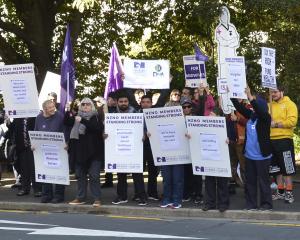For about five years, the resource-stretched Dunedin Hospital department restricted surveillance colonoscopies, procedures performed on asymptomatic patients who because of family or personal health history are at higher risk.
''The reason that we embarked on this [review] is that a patient did present with cancer who would have been offered a colonoscopy earlier. The patient's alive, and the patient's had - as far as I understand - curative treatment,'' Dr Hill said.
Dr Hill, who arrived at the board in October, did not know exactly when the woman presented. He understood her risk was based on family history, and she would have been considered at a moderate increased risk. As it was before his time, he did not fully know what was offered while surveillance was restricted to those at higher levels of risk.
''I can't give you a specific answer as to what wasn't or was provided here [in Dunedin].''
The review of past cases was also ''timely'' because of increased staffing in the department, he said.
Since last September, the hospital has looked at hundreds of cases, and had determined about 220 patients required a colonoscopy, Dr Hill said.
Asked if any would have developed polyps, he said: ''I think it's almost certain some of them will have developed polyps in the meantime.''
Once the procedures were carried out, the board would disclose information about how many patients had developed cancer or polyps, he said.
Concluding the review would allow the department to move on.
''It's held the department back; the department works very hard.
''It's negative, and it does nothing to engender any pride in the department when all we hear is very negative things.''
Dr Hill hoped to clear the backlog by December, and planned to use the private sector to help get through the cases.
Dr Hill, who worked in Waikato previously, said Dunedin's restrictions on the procedure were not unusual and had happened in other parts of New Zealand. However, Southland Hospital had not restricted the procedure. Initially, 732 patients were identified as potentially affected by the restrictions, and it was found about 400 had had the procedure, some having waited an extended period of time. He could not say whether some had opted to have their procedure in the private sector.
Some patients had left the district, some had turned 75 and were no longer eligible, and some had died from other causes.
Dr Hill, who leads gastroenterology services for Otago and Southland, said general colonoscopy waiting times varied, with the shortest waits in Dunedin.
Surgical medical director Murray Fosbender said plans were still on hold for new endoscopy facilities, a long-awaited development at Dunedin Hospital. There was ''big dough'' attached to capital works, and it was important to get it right, by planning carefully, Mr Fosbender said.
He now favoured extending the existing Dunedin unit, rather than establishing another unit in a different part of the hospital.








